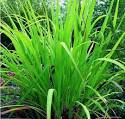






PalmaRosa (Rose Geranium) Palmarosa is sometimes referred to as Rose Geranium
A wild-growing herbaceous plant with long slender stems and terminal flowering tops, the grassy leaves are very fragrant. The essential oil is obtained by steam distillation of the fresh dried grass. Palma Rosa or Indian Geranium, is anti-bacterial, balancing and regenerating, Indian Palmarosa essential oil is obtained from a wild grass native to India, this essential oil has a sweet floral fragrance. Palmarosa is a valuable antiseptic that suits all skin types, soothing and stimulating, uplifting to the emotions, and may be used in a room diffuser for it`s antiviral properties.
Native to India and Pakistan, now grown in Africa, Indonesia, Brazil and the Comoro Islands. In the past it was very important oil for the isolation of geraniol, but today it is cheaper to extract from Citronella Oil, although Indian Oil is possibly the most abundant, Madagascar oil is a finer quality. Properties– Antiseptic-bactericidal-cicatrisant-digestive-febrifuge-hydrating-Stimulant tonic-insect repellent-skin conditioner-skin regenerating-soothing agent-muscle relaxant-antifugal.
Principal Constituents
%:Limonene 0.%-Linalool 3.7-Alpha-humulene-1.9 Geranyl acetate 9.6-Geraniol 78.9-Nera l0.8- (Z,E)-Farnesol 1.2-beta-caryophyllene 1.6 Uses: Used extensively as a fragrance component in cosmetics, perfumes and especially Soaps due to excellent tenacity. Aromatherapists recommend Palmarosa as an oil to diffuse during flu epidemics. Ist action against viral illnesses and against bacteria, together with it`s pleasant smell make it a great oil to use to disinfect a room.
Blends With:
Cananga-Geranium-Oak Moss-Rosewood-Amyris-Sandalwood-Guaiac Wood Fennel-Orange-Lemon-Lavender-Patchouli-Sandalwood.
Precaution:
Safe to use for all skin types-nontoxic–non-irritant-non-sensitizing.
Reference: Int Therapist/Nov/Issue 61/2004
Articles Latest
- Chamomile Roman - Chamaemelum nobile
- Chamomile Maroc - Ormenis multicaulis
- Chamomile German - Matricaria recutica
- From Biology To Aromatherapy
- Plant Messengers
- Celery Seed-Apium graveolens
- Cedarwood Virginian - Juniperus virginiana
- Cedarwood, Texas- Juniperus ashei - Essential oils
- Cedarwood Atlas- Cedrus atlantica - Essential Oils
- Cassie - Acacia Farnesiana - sweet acacia
- Cassia - Cinnamomum Cassia
- Cascarilla Bark - Croton eluteria
- Carrot Seed- Dacus Carota
- CARDAMON
- CARAWAY
- CANANGA
- CAMPHOR
- CALAMUS
- Calamintha-Calamintha officinalis
- CAJEPUT- Melaleuca cajeputi
- Plant Expression
Articles-Most Read
- Home
- Balsam Canadian - Abies balsamea
- Balsam Peru
- Copaiba Essential Oil
- North America: Tea Tree and Monarda-3
- Basil French - Ocimum basilicum
- Basil Exotic
- North America: Tea Tree and Monarda-2
- Exploring Transcultural Constants
- Thyme Essential Oil
- Balsam Tolu
- Palma Rosa
- Bay - West Indian - Pimenta racemosa
- The Bioactivity of Essential Oils
- Benzoin - Styrax benzoin
- Why Pharmacology Cannot Demonstrate Essential Oil Efficacy
- Exploring Essential Oil Activity The Conventional Way
- Complex information From Plants
- Aromatherapy: An Answer
- Contacts
